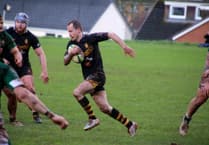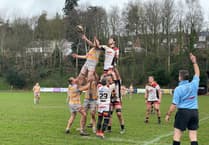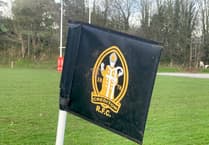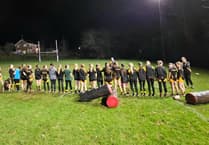WEDNESDAY, March 30, 1955, the season was drawing to a close and it had been quite a remarkable season, the First XV at that stage had won 22 of their 27 games to-date, whilst the Seconds had won 13 of their 17 games.
On this particular day, we were playing the Exeter First XV in a fundraising game in aid of the St Boniface Fund. The Crediton fullback on that evening was Noel Estcourt who, only 11 days earlier was the England fullback in the 9-6 victory over Scotland at Twickenham.
The inevitable question is of course, how did the England fullback come to make his debut for Crediton just days after representing England?
Had he heard of how successful our season had been and thought, yes that is the Club for me? Well, no not quite, nice thought though it may be, Estcourt had in fact married a Crediton girl, Jennifer Pickwoad, the previous year. Estcourt was a Blackheath player and was presumably taking some time out after the five Nations games and visiting the in-laws.
He was a most interesting character and all-round athlete, born in Rhodesia he excelled at both rugby and cricket and attended University in South Africa where he played both sports for Eastern Province.
He came to England and gained his Masters at Cambridge and, whilst playing at Blackheath earned his selection to the England team.
However, it was to be his one and only international appearance as he returned to Rhodesia to take up a teaching post.
He left behind a potential sporting career that would undoubtedly have blossomed.
As regards the game against Exeter, we lost 3-12 and whilst Escourt played only once for England, he did play one more game for Crediton the following Saturday and scored a try in the 9-6 defeat at Tiverton.
The Crediton team on that day was: N. Estcourt; L. Cockayne, J. Way, J. Hill, L. Bradfield; J. Stevens, A. Bond; T. Hartnell, T. Allen, B. Blackmore, F. Howarth, M. Roach, H. Cornish, B. Cope and R. Stoyle.
The season as a whole ended with an impressive record for both the First and Second XV’s.
The Firsts suffered just six defeats all season, Plymouth Albion Utd, St. Luke’s College, Devonport Services, Exeter Firsts, Tiverton and Sidmouth.
The long list of 29 victories brought glowing reports from the press claiming it was time that Crediton returned to the senior ranks of Clubs in Devon, on a par with the likes of Exeter and Plymouth and, whilst it may be said that we did not reach that level, we always gave a good account of ourselves against opponents at that level.
The Second XV suffered a number of cancellations but still managed to win 15 of their 19 games, St. Luke’s College Seconds, Sidmouth Seconds and South Molton Firsts were the only sides to get the better of the ‘Quins. The strength of the Second XV, with a number of younger players proved an invaluable support for the First XV and certainly laid the foundation for a continued stream of good players coming through.
Of course, Noel Estcourt was not the first international to include Crediton RFC on his CV, that honour was claimed 55 years earlier by Alfred Nolan Fell, or simply Alfred as he preferred it.
Fell was a New Zealander who had come to the UK in order to continue his medical studies at Edinburgh University.
It so happened that Fell had an aunt living in Crediton who was married to local solicitor William Pope, hence the link with Crediton RFC.
He had already played for Otago Province by the time he was 19 and played in the notorious “Butchers Match” against Wellington, he actually came on as a replacement (yes they were allowed in New Zealand at the time).
Fell would spend the vacations in Crediton and would always turn out for the Club for the first month of the season.
However, his performances for Edinburgh University soon came to the attention of the Scotland selectors and it was not long before he was in the Scotland team and is claimed to be the first Scottish Kiwi.
In total, Fell played seven times for Scotland but his international career ended on a somewhat sour note when he was selected to play against the touring New Zealand team in 1905.
On the grounds that he felt unable to play against his fellow countrymen. He was never selected again and one of the press headlines of the day read “We do not like thee Doctor Fell - The Reason Why we cannot tell”.
Whenever he was in Crediton, he was much sought after by the County and was selected on a number of occasions but unable to accept as the games were always when he was back at university.
However, he went on to enjoy an illustrious medical career and his love of rugby continued when, living in Colchester, he was one of the founder members of Colchester RFC and remained the Club President for many years.
Paul Harris




